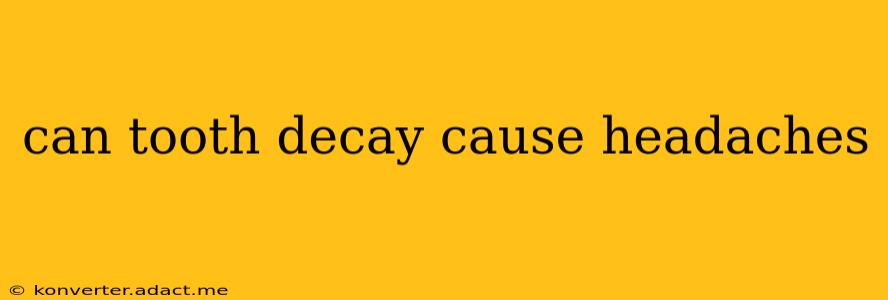Many people experience headaches, and while the causes are varied, you might be surprised to learn that seemingly unrelated issues like tooth decay can be a contributing factor. This article explores the connection between tooth decay and headaches, answering common questions and providing insights into managing both conditions.
How Can Tooth Decay Lead to Headaches?
Tooth decay, or dental caries, is caused by bacteria that produce acids that erode tooth enamel. This erosion can lead to cavities, and if left untreated, can progress to more serious problems like abscesses (pus-filled pockets). These infections can cause significant pain, often radiating to other areas of the head and face, resulting in headaches. The pain isn't just a direct result of the infection itself; the inflammation and pressure build-up within the tooth and surrounding tissues can trigger nerve endings, leading to the perception of a headache.
The type of headache associated with tooth decay is often described as a throbbing, sharp, or aching pain concentrated in the jaw, temples, or even behind the eyes, on the same side as the affected tooth. The pain can be constant or intermittent and may worsen with chewing or biting.
What Types of Headaches Are Linked to Tooth Decay?
Several headache types can be associated with tooth decay and related dental issues. These include:
-
Tension headaches: While often caused by stress, muscle tension in the jaw due to tooth pain can contribute to or worsen tension headaches. The constant clenching or grinding of teeth (bruxism), sometimes a response to tooth pain, further exacerbates this.
-
Sinus headaches: Though distinct from toothaches, severe dental infections can sometimes mimic sinus headaches, given their proximity. Inflammation near the sinuses could contribute to similar pain patterns.
-
Cluster headaches: While less commonly directly linked, underlying dental issues might trigger or worsen cluster headaches in susceptible individuals. It is vital to consult a doctor or headache specialist for this.
Can a Toothache Cause a Headache in the Back of My Head?
While the pain from a toothache is typically felt in the jaw, teeth, and adjacent facial areas, referred pain is a possibility. This means that pain originating in one location can be felt in another due to the complex interconnectedness of nerves. In severe cases, the referred pain from a severely infected tooth could potentially radiate to the back of the head, although this is less common than pain felt closer to the source.
How Do I Know if My Headache Is Caused by Tooth Decay?
Pinpointing the exact cause of a headache requires a thorough examination. While a toothache might feel like a headache, several clues can help distinguish the two:
-
Localized Pain: Toothache pain is usually more localized to the affected tooth and the surrounding area of the jaw. Headaches tend to be more widespread.
-
Pain Triggered by Chewing or Pressure: Pain worsened by chewing, biting, or applying pressure to a specific tooth is a strong indicator of a dental problem.
-
Sensitivity to Temperature: Increased sensitivity to hot or cold temperatures in a specific tooth suggests tooth decay or other dental issues.
When Should I See a Dentist or Doctor?
If you're experiencing headaches and suspect a dental cause, it's crucial to consult a dentist. They can perform a thorough examination, diagnose any underlying dental problems, and recommend appropriate treatment. If the pain is severe, persistent, or accompanied by other symptoms like fever or swelling, seek immediate medical attention. Your dentist can work with your physician to manage your headache, and rule out other potential causes.
What Are the Treatment Options for Tooth Decay-Related Headaches?
Treatment focuses on addressing the underlying dental problem causing the headache. This might involve:
-
Fillings: Repairing cavities with fillings to restore the tooth's structure and eliminate the source of pain.
-
Root Canal: For deeper infections, a root canal treatment removes the infected pulp (inner part of the tooth) to prevent further infection and alleviate pain.
-
Extraction: In severe cases, extraction of the affected tooth might be necessary.
-
Antibiotics: In cases of infection, antibiotics may be prescribed to combat bacterial growth.
Remember, early diagnosis and treatment of tooth decay are essential in preventing more serious complications and associated headaches. Regular dental check-ups and good oral hygiene are crucial for maintaining oral health and preventing tooth decay from becoming a source of head pain. Don't hesitate to reach out to your dentist if you have any concerns.
